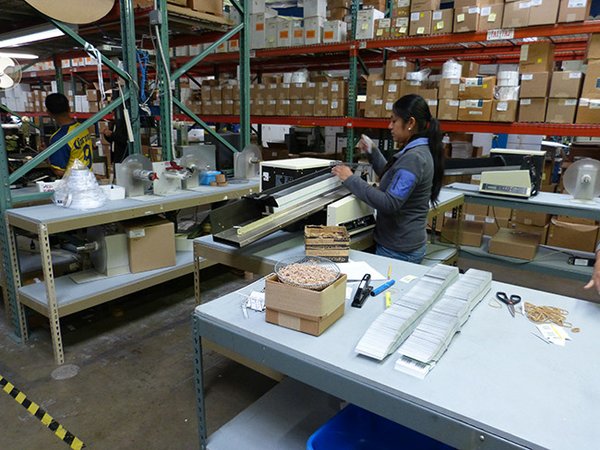SOCAL BASE: Progressive Label employs about 35 people in its facility in Commerce, Calif. The company also has operations in Mexico and Hong Kong.
MANUFACTURING
Brand Building Behind the Scenes
When a designer is first considering launching a line, the first step may be researching the market and creating mood boards, or it might be shopping for textiles or creating original prints and embellishments—followed by design, patternmaking and samples. For some, the last step before going to market is ordering labels, hangtags and creating a lookbook. But for the team at Progressive Label, that last step is their core business.
The 25-year-old, family-run company started with two cousins and a printer. Today, the Commerce, Calif.–based company has about 35 employees in the U.S. (including several more family members) and company-owned facilities in Puebla, Mexico, and Hong Kong.
“Having a global presence allows us to serve a broader range of customers,” said Bill Garcia, one of the latest family members to join the company.
Garcia retired from Xerox in December, where, as vice president of sales, he ran the company’s West Coast sales operations. He joined his brother Gus Garcia and cousin Adam Flores, founders of Progressive Label, just as the company started launching several new developments.
At the forefront of those developments is a new online purchasing system that simplifies the process of ordering hangtags and price tickets. FlashTrak is a proprietary system developed in-house, which incorporates the company’s years of experience providing tags and labels for apparel manufacturers.
“It really streamlines operations,” Bill Garcia said. Before launching FlashTrak, most customers were ordering their tags by email. A single order could generate “five or six emails or more,” Bill Garcia said.
FlashTrak gives customers a graphic representation of the item they’re buying. Placing reorders is also easy, thanks to an order-history function that allows customers to pull up past orders. When you reorder, you can see it and the price comes up. And customers can check on the status of their order online to see if it’s in production, being finished or has already shipped. In addition, a chat function keeps a record of all communication regarding each individual order. The system also gives customers an estimated delivery date and lets them know which customer-service representative is assigned to their order.
“The more-technical trim buyers love it,” Gus Garcia said. “They can view each ticket per size and SKU—no waiting. They can proof them right there online.”
The next step for FlashTrak is to expand the online offerings to include care instructions—but the complexity of care labels makes it hard to automate.
“They keep adding languages,” Flores said. “I’m creating one in Arabic now. Some have 10 languages. We had one that had 27. It was like a book.”
In the past, a brand could customize a care label depending on where the garment was being sold. But with the proliferation of e-commerce, companies can no longer predict where the garment will eventually end up, so they hedge their bets and print care labels in multiple languages.
Tech for every process
Another new addition to the company is the Xerox iGen4 digital printer, which produces hangtags, price tickets, and marketing materials such as lookbooks, posters, stickers, window clings and other high-quality color printing.
“To the eye, the iGen is equivalent to an offset printing,” Bill Garcia said, adding that the iGen might be state-of-the-art, but it’s Progressive Label’s history that is the real point of difference for the company.
“The big difference I see is we’re not the only ones who have the iGen machine,” he said. “But we focus on the apparel industry. This is all we do. We bring an added level of experience.”
Another new project in the works is a new printable radio frequency identification (RFID) tag. By the end of the year, Progressive Label will be able to produce RFID tags in its Southern California facility, Bill Garcia said. The company will also be able to sell print devices with software for companies that want to have their own system.
“To be able to print on these RFID-enabled tags, you have to have a tech-savvy team,” he said.
Progressive Label’s label-making capabilities includes a Duplo DC743 for cutting and perforating tickets, rows of thermal printers for price tickets, hole-punch equipment, and machines that put special coatings on tags, tickets and marketing materials. There are older machines as well, carefully maintained, which cut, perforate and fold blank tickets, which Progressive Label also sells to other companies.
For companies that want a thermal printer in house, Progressive Label launched a separate division in January, PLI Print Tech, which offers sales, service and support for high-volume businesses that prefer to print product, compliance or shipping labels in-house.
Consistent message
Progressive Label has an in-house graphics team to help companies develop their marketing materials. “We have the ability to develop a logo, do the layout, select the paper and print,” Bill Garcia said.
Most brands will invest time and money in developing their image, Bill Garcia said. But when it’s time to print their tags, hang tickets and lookbooks, they’ll source each from different companies.
“[We tell them,] ‘Why don’t you take that image and communicate it through the entire garment? You want the item to have some consistency all the way down to the price ticket.’ We have the ability to do all of that,” he said. “Tags, price tickets, woven labels, buttons, wash instructions, hangtags, size strips—we build all of that.”























